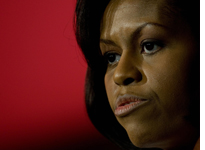What's in a Wife? - In an op-ed in the Guardian this morning, Jessica Valenti, founder of the blog Feministing and author of the book Full Frontal Feminism, discusses what she believes has been the media's unfair treatment of Michelle Obama, wife of Barack. Valenti writes, "Media coverage of [Michelle] Obama has packed a nasty racism-sexism combo that is quickly becoming a national disgrace." She cites unflattering depictions of Michelle in Fox News and the National Review, and claims that some right-wing commentators (she doesn't name any specifically) have said downright racist things about the prospective first lady. She also appears to be very strung out by the now-infamous New Yorker cover of some weeks back.
Unfortunately, Valenti goes too far in her claims, mistaking lack of pundit love for Michelle for racism. Of course anyone can find examples of crazed right-wingers who say racist, offensive things about the Obamas, just as any McCainiac could look to the far left in drumming up outrageous examples of McCain hate. There has not been widespread racism toward Michelle Obama in the mainstream media. In fact, I would dare to say she's gotten away with a lot precisely because the media are afraid of being accused of racism—for instance, her rather bold assertion that this was the first time in her adult life that she was "really proud of [her] country."
In getting hung up on the race point, Valenti undermines the more important aspect of this issue, which is what constitutes the image of the American "political wife." The very term itself points to the sexism associated with the way we judge most (male) candidates' wives. There is a definite image of the political wife that these ladies are encouraged to follow, and someone like Laura Bush epitomizes this character. She's meek and well-mannered, and she has completely worthy yet completely innocuous pet causes like literacy rates. Lovely, worthy, but not exactly a firebrand. Like Teresa Heinz Kerry, who took flak in 2004 for being strong-willed and for rubbing people the wrong way, Michelle Obama defies that stereotype.

I don't particularly like Michelle Obama, because I think a lot of what she's said in this election cycle has been in poor taste (I agreed with Maureen Dowd about the butter-and-toast shtick being tiresome back in 2007). Still, if there's anything we can take away from Valenti's confused rant, it is this sense that we've been late to modernize our conception of what a candidate's wife looks like. Valenti and friends would do well to focus their energies on that important discussion as opposed to the race-card fallback. ( slate.com )
Unfortunately, Valenti goes too far in her claims, mistaking lack of pundit love for Michelle for racism. Of course anyone can find examples of crazed right-wingers who say racist, offensive things about the Obamas, just as any McCainiac could look to the far left in drumming up outrageous examples of McCain hate. There has not been widespread racism toward Michelle Obama in the mainstream media. In fact, I would dare to say she's gotten away with a lot precisely because the media are afraid of being accused of racism—for instance, her rather bold assertion that this was the first time in her adult life that she was "really proud of [her] country."
In getting hung up on the race point, Valenti undermines the more important aspect of this issue, which is what constitutes the image of the American "political wife." The very term itself points to the sexism associated with the way we judge most (male) candidates' wives. There is a definite image of the political wife that these ladies are encouraged to follow, and someone like Laura Bush epitomizes this character. She's meek and well-mannered, and she has completely worthy yet completely innocuous pet causes like literacy rates. Lovely, worthy, but not exactly a firebrand. Like Teresa Heinz Kerry, who took flak in 2004 for being strong-willed and for rubbing people the wrong way, Michelle Obama defies that stereotype.

I don't particularly like Michelle Obama, because I think a lot of what she's said in this election cycle has been in poor taste (I agreed with Maureen Dowd about the butter-and-toast shtick being tiresome back in 2007). Still, if there's anything we can take away from Valenti's confused rant, it is this sense that we've been late to modernize our conception of what a candidate's wife looks like. Valenti and friends would do well to focus their energies on that important discussion as opposed to the race-card fallback. ( slate.com )
No comments:
Post a Comment